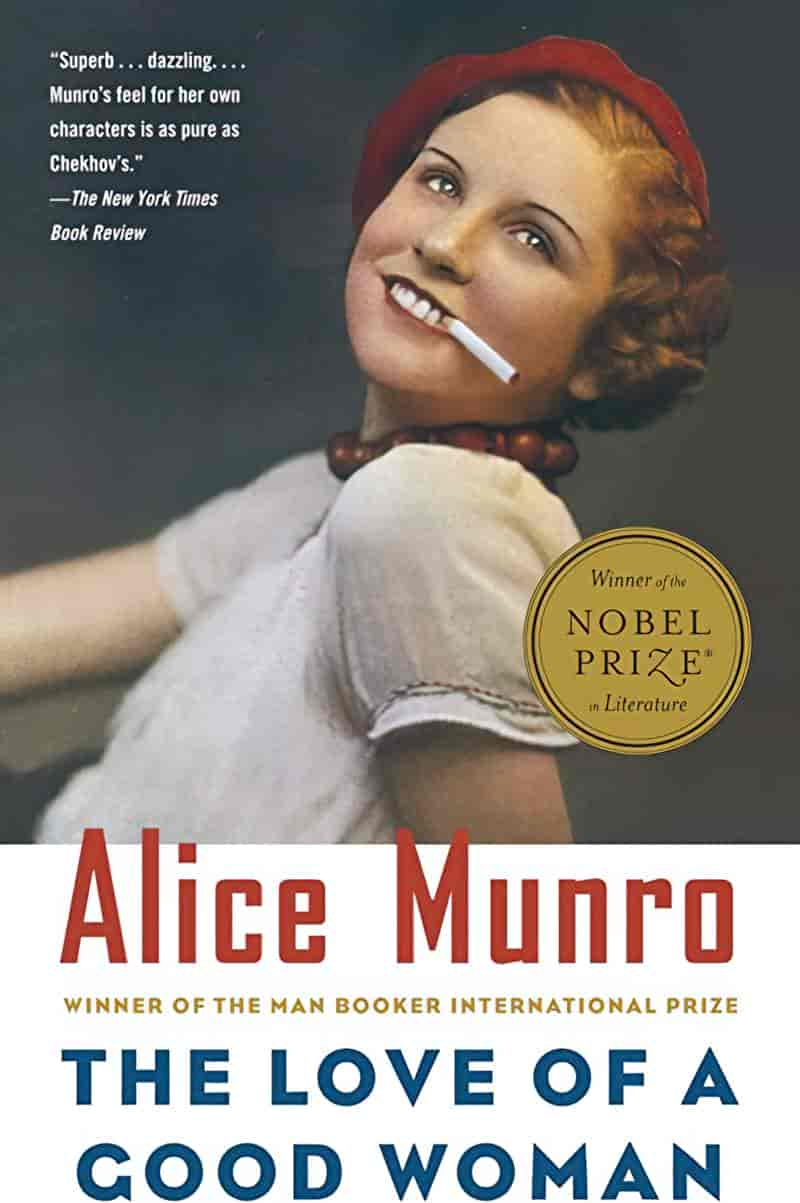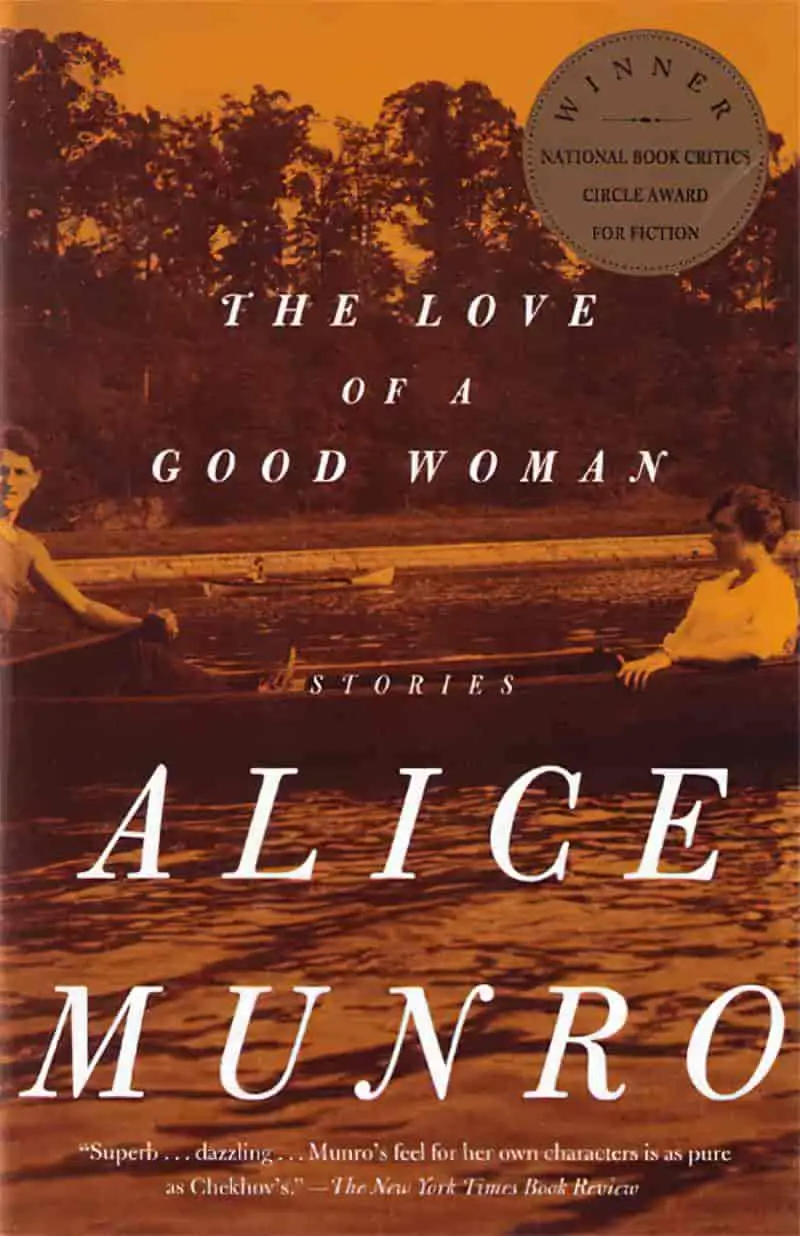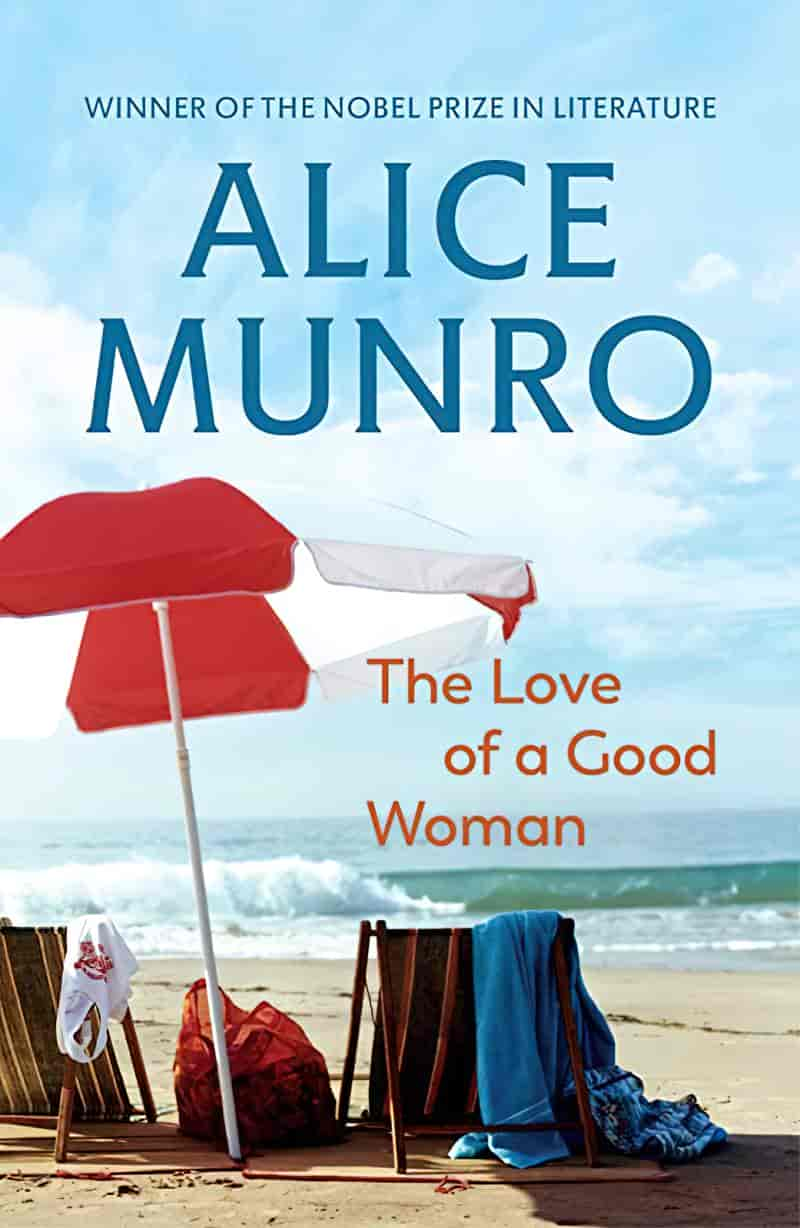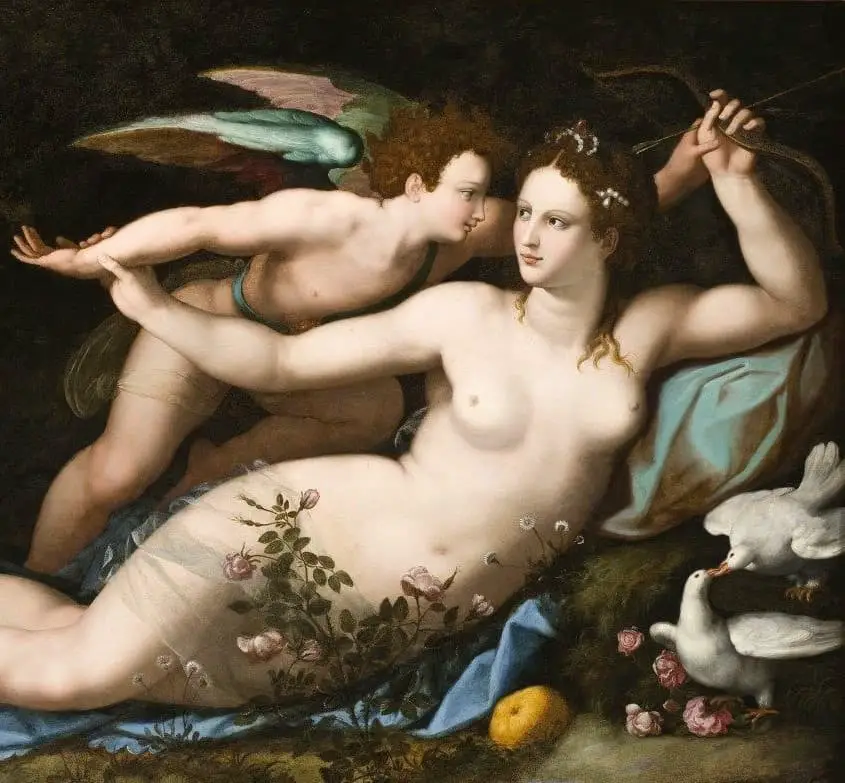“The Children Stay” is a short story by Alice Munro, published in the collection The Love Of A Good Woman (1998). It’s very difficult to write empathetically about women who leave their husbands and children for another man, especially when it’s purely lust driven rather than depicted as ‘pure love’. This is because mothers are held to a higher standard. Alice Munro’s monumental task is to get the reader to understand exactly why a woman might do as Pauline did. This involves getting deep into Pauline’s mind. I think she manages it perfectly.
THE LOVE OF A GOOD WOMAN (1998)
- “The Love Of A Good Woman” — a story revolving around a crime but not a crime story. Reminiscent of Stand By Me. Also in the December 23, 1996 edition of The New Yorker.
- “Jakarta” — not actually set in Jakarta. A story of an old woman whose husband went missing, and also about the so-called ‘free love’ of the 1960s, which afforded far more freedom to men.
- “Cortes Island” — a symbolic island standing in for the psychology of newly wed isolation. Also in the October 12, 1998 edition of The New Yorker.
- “Save The Reaper” — a re-visioning of Flannery O’Connor’s “A Good Man Is Hard To Find”. Also in the June 22, 1998 edition of The New Yorker.
- “The Children Stay” — What did divorce look and feel like when divorce was brand new? Also in the December 22, 1997 edition of The New Yorker.
- “Rich As Stink” — Focuses on an adolescent girl. Some commentators call her ‘precocious’ but I think she is a typical 11-year-old.
- “Before the Change” also in the August 24, 1998 edition of The New Yorker
- “My Mother’s Dream” — Critics don’t love this one, but I do. I read this short story as a commentary on how it takes a village to raise a child, and when any given mother doesn’t measure up as parent, other women can step in. Together, caregivers can band together to create a ‘whole’, and bring up a perfectly rounded and cared-for child, but alone? No. And we shouldn’t expect mothers to be perfect.




SETTING OF “THE CHILDREN STAY”
One thing I find interesting about the work of Alice Munro: She does not open her stories with ‘sizzling starts’. She goes out of her way to ground the reader in time and place before launching in to what is objectively a more interesting paragraph: the second one. The story opens like this:
Thirty years ago [TIME], a family was spending a holiday [EVENT] together on the east coast of Vancouver Island [PLACE]. A young father and mother, their two small daughters, and an older couple, the husband’s parents [CAST OF CHARACTERS].
The second paragraph is the literary one:
What perfect weather [A PHRASE REMINISCENT OF KATHERINE MANSFIELD]. Every morning it’s like this, the first pure sunlight falling through the high branches, burning away the mist over the still water of Georgia’s Strait…
Alice Munro clearly believes that passages of beauty are wasted on readers who have yet to get their bearings. However, I think far more short story writers begin with something more like Munro’s second paragraph, under the idea that unless we can wow the reader with tone and language, they won’t be sufficiently impressed to read on.
Like all of Alice Munro’s stories, the broad setting is geolocatable.
ERA
The main part of this story takes place 30 years in the past. The collection was published in the late 90s, which places this story in the late 1960s.
CHARACTERS IN “THE CHILDREN STAY”
Pauline
What we are told via the technique of narrative summary:
- The 26 year old mother has two daughters, one five, one just coming out of babyhood. (Caitlin and Mara.)
- She doesn’t really like the beach but prefers the road that runs behind the cottages. We are not initially told why. The reason will be revealed.
- An early riser. (This is to tend to the children.)
- She gets herself ready to go out ‘as quickly and quietly as possible’.
- It is Pauline rather than Brian who gets up to tend to the children, even on holiday, even though both of them are parents.
- Has little to say to her father-in-law ever. However, they share in common a bleak outlook.
- ‘On this holiday Pauline steals time to herself–being with Mara is still almost the same thing as being with herself’.
- This September she is going to be in a play back home and she would like time alone to learn her lines. “Pauline is not an actress…she is not even an amateur actress.” The play is Eurydice.
What I deduce from her thoughts, actions and dialogue:
- Pauline is the outsider in this extended family group, having not grown up in Brian’s family. She shares this in common with her children, but the daughters are not yet old enough to provide much company.

BRIAN
What we are told:
- Brian is Pauline’s husband.
- He carries the baby’s playpen down every day to the beach saying that his parents may be offended if his wife is always sneaking off.
- He is a 30 year old high school math teacher.
- People say he acts younger than his age.
- He’s an only child.
What I deduce:
- Brian is in low level competition with the patriarch of the family (the baby’s grandfather). “The two men are continually trying to decide which is what.”
- Although he is involved in the care of his children on this holiday, he does rare and performatively helpful things rather than the grind that is waking up early and spending all day with them.
- As part of the patriarchal system, learned from his father, Brian isn’t able to fully understand how it works as an outsider. He is not as astute as his wife, especially when it comes to understanding his own father’s relationship with women, his mother and his wife.
GRANDFATHER, BRIAN’S FATHER
We are told:
- He is an early riser.
- He considers the holiday destination a utopia and will hear no criticism of it.
- Civil engineer and part owner of a contracting company.
I deduce:
- His unwillingness to accept the holiday is anything less than perfect intertwines with his feeling responsible for the entire holiday and connects to his patriarchal self-importance in general.
- He is an old school sexist who believes women e.g. his wife can’t read maps. (This is unoriginal Alan Pease ideology from the 1990s. Pease wrote the bestselling Why Men Don’t Listen and Women Can’t Read Maps
Munro’s depiction of Brian’s father is particularly subtle and nuanced and relatable:
“It’s not that,” said Pauline. But at this point she felt that something had been achieved by her father-in-law, he had done what he meant to do, which was the same thing he nearly always meant to do, in any conversation she had with him.And that was to break through the structure of some explanation he had asked her for, and she had unwillingly but patiently given, and, with a seemingly negligent kick, knock it into rubble. He had been dangerous to her for a long time in this way, but he wasn’t particularly so tonight.
The Children Stay by Alice Munro
GRANDMOTHER, BRIAN’S MOTHER
We are told:
- She is always performing the social and emotional labour of keeping the extended family watered and fed.
- “It’s so hard to make sense of anything,” Brian’s mother said with a worried laugh. “It’s so hard, with Brian around.”
I deduce:
- She has learned to steer clear of her husband’s petty competitions. It is easier to let him believe that women can’t read maps.
- Her care is probably experienced as interfering at times, as it extends to whether others are wearing a hat and it’s probably quite annoying to have someone bring up unpleasant scenarios from history to encourage certain behaviours, however helpful and well-meaning.
JEFFREY
Pauline’s lover is deliberately unrounded, more of a theatre hipster archetype. This reflects the extent to which Pauline herself doesn’t know him, either. Towards the end of the story:
There’s a lot she doesn’t know. She hardly knows anything about what he likes to eat or what music he likes to listen to or what role his mother plays in his life (no doubt a mysterious but important one, like the role of Brian’s parents). One thing she’s pretty sure of–whatever preferences or prohibitions he has will be definite.
Something is coming now. A truck. But not just a truck–there’s a large bleak fact coming at her. And it has not arrived out of nowhere–it’s been waiting, cruelly nudging at her ever since she woke up, or even all night.
Caitlin and Mara.
STORY STRUCTURE OF “THE CHILDREN STAY”
“The Children Stay” is basically a Shirley Valentine plot: A woman goes on holiday (this time with her family), has a revelation that she’s frittering her life away as a wife and mother, so decides to leave. But she doesn’t end up with the man she sleeps with while on holiday; he has simply been a part of him finding herself.
PARATEXT
The title of the collection is “the love of a good woman”, so the reader expects this to be a female focused story, but also about her relationships with other people, probably a man. There is otherwise no clue in the marketing copy about what to expect in this particular short story.
INTERTEXTUALITY
It is soon revealed that Pauline, when not on holiday, is practising for a play called Eurydice. The Greek myth is surely symbolic to this modern story. Sure enough, it’s explained within the text:
“The story of Orpheus and Eurydice is that Eurydice died,” Pauline said. “And orpheus goes down to the underworld to try to get her back. And his wish is granted, but only if he promises not to look at her. Not to look back at her. She’s walking behind him–“
The Children Stay by Alice Munro
“Twice paces,” said Brian. “As is only right.”
“It’s a Greek story but it’s set in modern times,” said Pauline. “At least this version is. More or less modern. Orpheus is a musician travelling around with his father–they’re both musicians–and Eurydice is an actress. This is in France.”
The palimpsestic Greek myth of Eurydice and Orpheus works doubly:
- Like the Greek Eurydice, Pauline walks in her husband’s shadow, though it’s nowhere near as obvious. Bryan never looks at Pauline in a way that really sees her.
- In the updated play, Eurydice is an actress just as Pauline is an actress. They’re travelling around as a similarly shaped family unit, though not as musicians, simply on holiday.
The play-within-a-story has a distancing effect, underscored elsewhere:
Readers are inherently distanced from the story naturally, in the role of reader, by the years which intervene between Pauline’s experience and her recollections, by the cellophane and the harbour streets, and by the play-within-a-play motif.
Buried In Print
Within the story, Munro, via her literary-minded character, also mentions Anna Karenina and Madame Bovary — examples of how classic writers have encouraged or discouraged empathy with fictional women who dare step outside the bounds of the patriarchy.
SHORTCOMING
Munro quite likes to use islands as a geographical representation of loneliness. Pauline is never more alone as when she’s with her family 24/7 on holiday. Pauline is the classic ‘appreciated outsider’ variety of lonely:
Pauline was the one who went out at the break to get softdrinks and coffee. She was the one who had the least to say about the play and the way it was going–even though she was the only one who had read it before–because she alone had never done any acting.
The Children Stay by Alice Munro
In the play, Pauline is ‘supposed to be a person who had already died’, but this also describes the way Pauline’s former self has died after marriage and the endless responsibilities of childcare.
She needs a life of her own. She achieves this imaginatively by becoming an actor in a community play, and the integration of fantasy into real life leads to an extramarital relationship with the director.
In the story, Munro refers to this as Pauline’s ‘secret life’, though I prefer to think of what people do with others as ‘private lives’ and what they keep entirely in their head, unshared, as genuinely ‘secret’.
Pauline’s character arc mainly revolves around her change in attitude toward fate. At the beginning of the story she believes we lead choice-driven lives.
“Everybody has choices,” Pauline said dreamily….
The Children Stay by Alice Munro
To her surprise, Brian laughed.
“No,” she said. “That’s what’s stupid. It’s not inevitable. It’s not inevitable at all.”
By the end of the story she will have to change this view or feel massive guilt for leaving her husband and children.
DESIRE
On the surface, it seems Pauline wants sex with an interesting acquaintance. But her deeper desire is to be understood. There’s no evidence that Jeffrey understands her any better than Brian does. Rather, Munro suggests that Pauline understands completely that Jeffrey will after a time be no more attractive and alluring than Brian, probably less so, as a long-term partner. It seems to me that Pauline wants out of her marriage, and uses the opportunity with Jeffrey to confirm this to herself.
OPPONENT
Brian is her romantic opponent, and the father-in-law is an amplified version of Brian. The father-in-law is therefore particularly useful to the storyteller, and also helps the rounding of Brian. Brian isn’t too bad compared to his father. But is he? Is he really that good, either? How bad does a husband have to be before women can justify leaving him? Just… better than the patriarchs of the earlier generation? Is that really good enough?
The opposition set-up of this story asks us to consider that deeply.
It’s interesting that Jeffrey is not the opponent, as we might expect in a different kind of ‘married woman has an affair’ story. When first introduced, I expected Jeffrey to disappoint wholly, for him to reveal himself as a fratboy, amplifying the wonderful qualities of fatherly Brian, but I have been conditioned to expect that, and now I see exactly what Munro is doing here by avoiding depicting Jeffrey as such: Munro doesn’t want us to feel that way about Brian. There are so many traditional stories out there vilifying sexual, unfaithful, promiscuous women, and Munro has been very careful not to add to the corpus.
Jeffrey is instead an ally. He was the person who instigated Pauline leaving her unhappy marriage. He was also probably insufferable, because why wouldn’t he be? Importantly, Munro leaves the essence of Jeffrey off the page, showing that there are very good reasons behind storytellers’ decisions to either round out a character or keep them flat.
PLAN
Pauline isn’t the only married woman of Munro’s creation to have an affair. Each story, each affair, ends differently in an Alice Munro short story, but the women share one thing in common: They don’t seem to ever choose it. Their sexual opportunities are presented as entirely driven by the men.
I wonder if this is because Alice Munro knows a sexually confident and forward woman will scarper any chance at audience empathy.
Even in bestselling stories published today, a sexually confident woman who ‘thinks she’s all that’ is used as a shortcut for ‘This is the evil woman’. (I’m currently reading The Other Mrs by Mary Kubica.)
THE BIG STRUGGLE
The struggle happens internally and we don’t really see it on the page: Only when Pauline makes the decision to visit Jeffrey do we realise she’s been so close to leaving. However, looking back on her situation, the loneliness shines through.
ANAGNORISIS
That was what Pauline must believe now — that there was this major difference in lives or in marriages or unions between people. That some of them had a necessity, a fatefulnes, about them, that others did not have.
The Children Stay by Alice Munro
The reveal for the reader comes later, in the final paragraph, when we learn Brian is so out of touch with his own wife that he has deduced who she’s been sleeping with and got it wrong, thinking it’s the very young, totally unsuitable guy playing Orphee when it’s in fact Jeffrey, her director.
The waiter was a clumsy Orphee.
The Children Stay by Alice Munro
“He’s only nineteen, he’s so shy Jeffrey has to keep at him. He tells him not to act like he’s making love to his grandmother. He has to tell him what to do. Keep your arms around her a little longer, stroke her here a little…”
NEW SITUATION
Her children have grown up. They don’t hate her. For going away or staying away. They don’t forgive her, either. Perhaps they wouldn’t have forgiven her anyway, but it would have been for something different.
The Children Stay by Alice Munro
This passage says something about mother guilt, and how children are very hard on their own mothers. Munro explores this in various other stories, notably in Deep Holes. Mothers must find their own happiness, independent of their families, if they are to be truly content with their lives, which are nonetheless always filled with pain no matter what.
Munro is sure to include an entire passion describing the pain, a passage which spans decades, hurtling the reader forward eventually to a time when the little girls are now adults and her brief affair with Jeffrey is over.
EXTRAPOLATED ENDING
On paper, Brian isn’t a bad husband. But our bar is low for husbands. No matter what else someone can do for us, ‘being understood’ comes first and foremost. Brian was never going to understand Pauline and the final paragraph confirms that Pauline was right to leave him.
A reviewer at Mookse and Gripes suspects the girls will be brought up by the pliable grandmother and I suspect she is right.
The problem is that although her husband is not determined to keep her (he appears to be married to his parents), he is determined that she cannot have the children (a gift he will give his mother, this reader thinks).
Mookse and Gripes
Fathers were only just starting to become involved in their children’s lives, and Brian left childcare to Pauline on their holiday.
RESONANCE
There are many stories about fate and our attitude towards it. Many of these stories feature trains as symbols, though in this story Munro has used a truck. When we meet an intriguing romantic possibility it is a common experience to believe fate has intervened. This is a very old feeling. In classical mythology, this intervention is given form in the shape of Cupid. (The Greek counterpart is Eros.)

Another short story about that feeling of fateful new love is “Something Childish But Very Natural” by Katherine Mansfield, in which a train features symbolically large.
Psychologists might label this particular cognitive bias ‘choice supportive bias’. Looking back on our lives, it seems the decisions we made happened ‘for a reason’ and were therefore the correct ones.
Women have not traditionally struggled with the moral dilemma of whether or not to leave a husband who does not understand her, because until very recently — around the time this story is set — women had no option but to stay. Also, we had fewer expectations about what a partner could bring to a marriage. We didn’t necessarily expect much in the way of an emotional connection.
There have always been stories about unsatisfying partnerships, but modern marriages can be unsatisfying in subtle ways. The end of a ‘not too bad’ modern marriage is not necessarily a tragedy.
FURTHER RESOURCES
“The Children Stay” discussed at The Short Story Podcast

